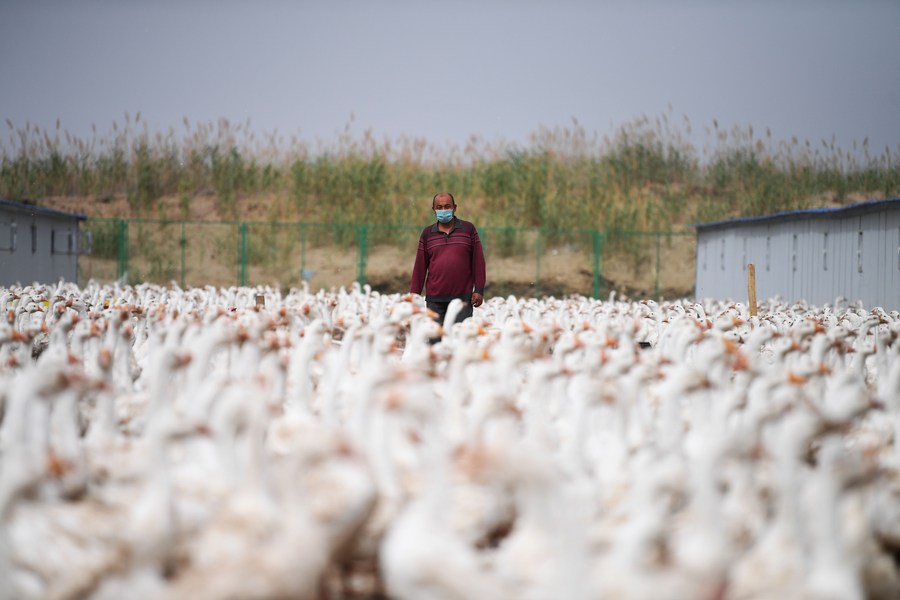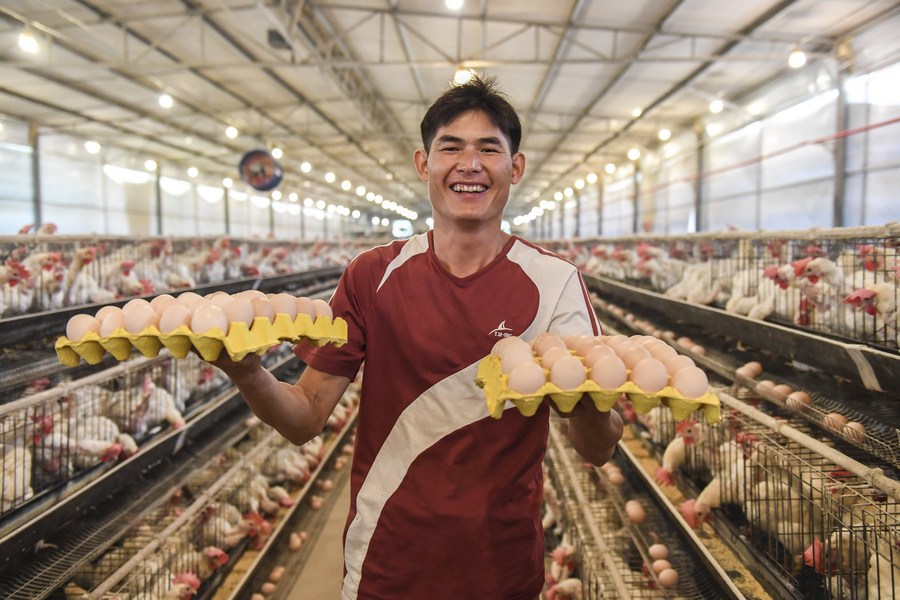Video: "Public institutions definitely have an important role to play in this process. That's also what we are seeing in China," says Zhang Jun, China's permanent representative to the United Nations, on Oct. 16, 2020. (Xinhua)
Thanks to its reform and opening up in the past four decades, China has lifted 700 million people out of poverty, accounting for more than 70 percent of global poverty reduction, says Zhang Jun. (Xinhua)
UNITED NATIONS, Oct. 16 (Xinhua) -- A Chinese envoy said Friday that public institutions play a major role in poverty eradication in China.
"Public institutions definitely have an important role to play in this process. That's also what we are seeing in China," said Zhang Jun, China's permanent representative to the United Nations.
With the commitment of the Chinese leadership and government, China has prioritized poverty eradication in its national strategy. Governments at all levels have done their utmost to promote concrete results of poverty alleviation, he told a webinar on strengthening the role of public institutions in achieving poverty eradication and sustainable development.

A worker checks the growth of geese at a goose incubation base in Yutian County, northwest China's Xinjiang Uygur Autonomous Region, May 19, 2020. Thanks to strenuous efforts from all sides, major progress has been achieved in Xinjiang. From 2014 to 2019, a sound economic momentum was sustained with an average annual GDP growth rate of 7.2 percent. Living standards of the local people have significantly improved with an average yearly growth of 9.1 percent in residential per capita disposable income, and more than 2.92 million out of the 3.09 million registered as impoverished people shook off poverty. (Xinhua/Sadat)
China has mobilized all social sectors and resources to fight poverty. Provinces with better economic conditions are paired up with less developed ones. Targeted assistance is provided to those in need. Government agencies, companies, social organizations and individuals are forging synergies in achieving the same goal, said Zhang.
China has adopted tailored policy measures to alleviate poverty, which includes sending officials to villages to help the local people, organizing vocational training, providing small loans, facilitating the resettlement of poor residents to better-off areas, and tapping the potential of e-commerce and tourism, he told the webinar, organized by the UN Department of Economic and Social Affairs in collaboration with China National Academy of Governance on the eve of the International Day for the Eradication of Poverty.

Qin Yongling, a homebound entrepreneur, shows chicken eggs collected from his farm in Renyuan Village of Jinji Township in Wuxuan County, south China's Guangxi Zhuang Autonomous Region, June 18, 2020. Over the past five years, Guangxi Zhuang Autonomous Region have conducted a series of poverty alleviation projects, such as accelerating the construction of transportation infrastructure in poor areas, carrying out a drinking water project, relocating over 710,000 impoverished people from inhospitable areas and improving the quality of education. (Xinhua/Cao Yiming)
To provide a sustained financial input, the Chinese central government is spending more on poverty reduction each year -- 146.1 billion RMB yuan (21.8 billion U.S. dollars) in 2020 alone. Great efforts are made to improve rural infrastructure and public services, such as roads, water and the power supply, communications, education, and health care, to facilitate poverty reduction efforts, he said.
Thanks to its reform and opening up in the past four decades, China has lifted 700 million people out of poverty, accounting for more than 70 percent of global poverty reduction. China's poor population dropped from nearly 99 million in 2012 to 5.5 million in 2019. For seven years in a row, China has lifted 10 million people out of poverty annually. This year, China is on course to lift out of poverty all its rural poor under the current Chinese standard, achieving the Sustainable Development Goal (SDG) on poverty reduction 10 years ahead of schedule, said Zhang.

People promote the sale of pomelos via livestreaming platforms in Pinghe County, southeast China's Fujian Province, Sept. 17, 2020. Lying in the southwest of Fujian Province, Pinghe is famous for the cultivation of pomelos with a planting area of around 700,000 mu (about 46,667 hectares). Today, the output value of industries related to pomelo has surpassed ten billion yuan (about 1.48 billion U.S. dollars) as the annual yield of pomelos here has reached 1.3 million tonnes. Increasing per capita disposable income from 2,141 yuan (about 316 U.S. dollars) in 1996 to 19,360 yuan (about 2,860 U.S. dollars) in 2019, the cultivation of pomelos has paved the way for poverty alleviation and better life for the farmers who engage in the industries. (Xinhua/Wei Peiquan)
While making great efforts at home, China is also extending assistance to other developing countries. China has helped built 24 agriculture and technology demonstration centers in Africa, benefiting 500,000 local people, and organized 100 training courses on poverty reduction covering Asia, Latin America, Africa, and Europe. The Belt and Road Initiative is expected to help lift 7.6 million people out of extreme poverty and 32 million out of moderate poverty, he said.
Poverty eradication is a common task of humankind and a primary goal of the 2030 Agenda for Sustainable Development. The COVID-19 pandemic is having a strong impact on the global effort of poverty eradication. Developing countries are suffering the most. An increasing number of people are pushed back to poverty. Meeting the SDG on poverty eradication is now a bigger challenge. The international community should take it as a matter of great urgency to uphold multilateralism and work in solidarity to promote progress in the global cause of poverty eradication, he said. ■



